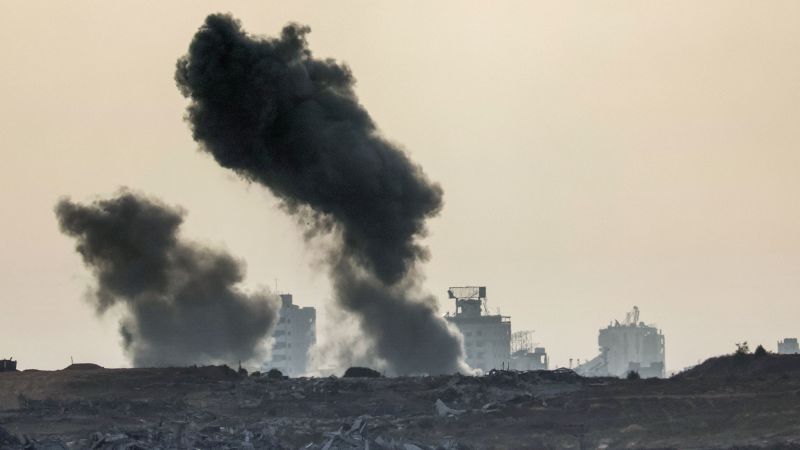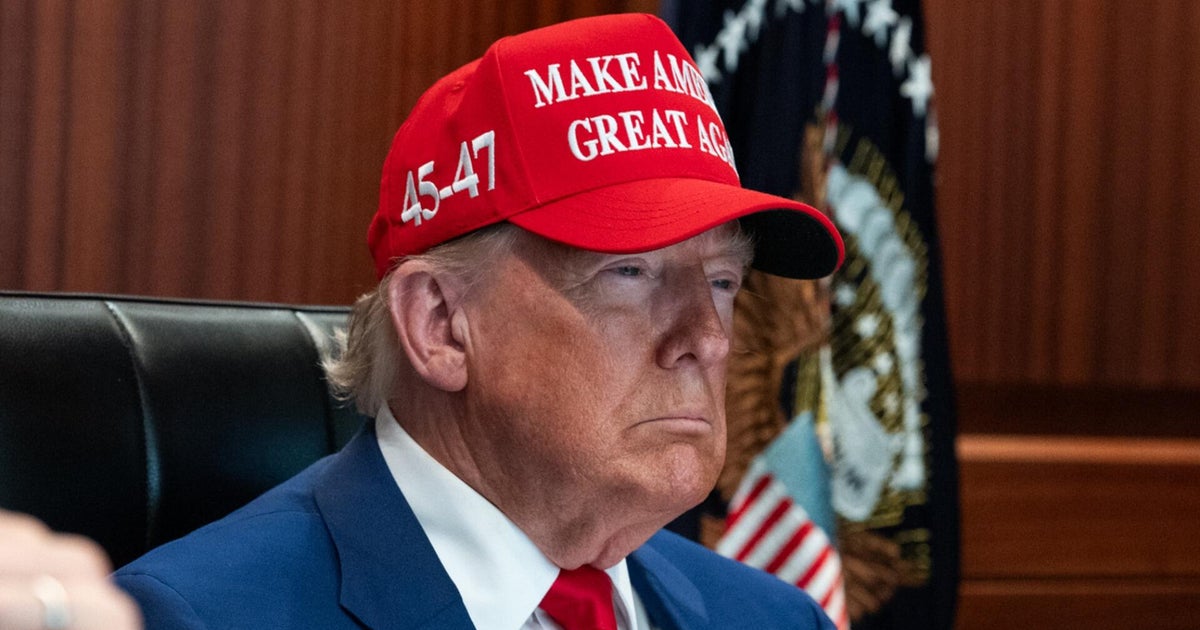Hamas Considering Ceasefire Proposal

Introduction
Hamas, the Palestinian militant group, has recently given a positive response to a proposal for a ceasefire in the Gaza conflict. This development comes as President Trump is set to meet with Israeli Prime Minister Benjamin Netanyahu to discuss the ongoing crisis at the White House on Monday.
Background
The conflict in Gaza has been ongoing for decades, with a long history of violence and tensions between Israel and Palestine. The current escalation began with the eviction of Palestinian families from East Jerusalem, which sparked protests and clashes in the city. This eventually led to Hamas launching rockets towards Israel, and Israel responding with airstrikes on Gaza.
Current Situation
After days of intense fighting, the ceasefire proposal was put forward by Egypt and the United Nations. Hamas initially rejected the proposal, stating that it did not address their key demands, including the lifting of the Israeli blockade on Gaza and the halting of evictions in East Jerusalem. However, they have now given a positive response with some reservations.
This development is seen as a glimmer of hope in the ongoing conflict, as both sides have shown a willingness to consider a ceasefire. However, it is important to note that previous ceasefire attempts have failed, and there are concerns about whether this one will hold.
The Role of the US
President Trump's meeting with Netanyahu on Monday is seen as a crucial moment in the conflict. The US has long been a key ally of Israel and has been criticized for its biased stance in the conflict. However, the Biden administration has taken a more balanced approach, calling for a de-escalation and a two-state solution.
It is yet to be seen if the meeting will result in any concrete actions or if it will have any impact on the situation. However, it does show a willingness from the US to play a more active role in finding a solution to the conflict.
Conclusion
The positive response from Hamas to the ceasefire proposal is a small step towards peace in the region. The ongoing conflict has caused immense suffering for both Palestinians and Israelis, and it is crucial for both sides to find a way to de-escalate and work towards a lasting solution. The role of the US in this process is also important, and it remains to be seen how the meeting between Trump and Netanyahu will impact the situation. However, it is clear that a lot more needs to be done to achieve lasting peace in the region.
About the People Mentioned
Donald Trump
Donald John Trump, born June 14, 1946, in Queens, New York, is an American businessman, media personality, and politician. He graduated from the University of Pennsylvania’s Wharton School in 1968 with a degree in economics. In 1971, he took over his family’s real estate business, renaming it the Trump Organization, through which he expanded into building and managing skyscrapers, hotels, casinos, and golf courses. Trump gained widespread fame as the host of the reality TV show *The Apprentice* from 2004 to 2015, which helped establish his public persona as a successful entrepreneur. Trump entered politics as a Republican and was elected the 45th president of the United States, serving from 2017 to 2021. His presidency was marked by significant policy actions including tax cuts, deregulation, the appointment of three Supreme Court justices, renegotiation of trade agreements (notably replacing NAFTA with the USMCA), and a focus on immigration control including border wall expansion. He withdrew the U.S. from international agreements such as the Paris Climate Accord and the Iran nuclear deal, and engaged in a trade war with China. His administration’s response to the COVID-19 pandemic was criticized for downplaying the virus’s severity. Trump was impeached twice by the House of Representatives—first in 2019 for abuse of power and obstruction, and again in 2021 for incitement of insurrection—but was acquitted by the Senate both times. After losing the 2020 election to Joe Biden, Trump challenged the results, culminating in the January 6, 2021, Capitol riot. He remains a central figure in American politics, having won the 2024 presidential election and returned as the 47th president in 2025, continuing to promote policies aimed at economic growth, border security, and military strength[1][2][3][4].
Benjamin Netanyahu
Benjamin Netanyahu, born on October 21, 1949, in Tel Aviv, Israel, is a prominent Israeli politician and diplomat who has served as Prime Minister of Israel three times (1996–1999, 2009–2021, and from 2022 onwards). He began his career in the Israeli military's special operations and later transitioned into politics in the late 1980s, joining the Likud party[1][2]. Netanyahu first became prime minister in 1996, during which time he signed the Hebron and Wye Accords, advancing peace efforts with the Palestinians. His administration focused on economic reforms such as government privatization, liberalizing currency regulations, and reducing deficits. After losing the 1999 election, he served as foreign minister and finance minister before reclaiming the Likud leadership in 2005[1][3][4]. Returning as prime minister in 2009, Netanyahu formed a national unity government and proposed a demilitarized Palestinian state recognizing Israel as the Jewish state, emphasizing security concerns. His tenure was marked by fluctuating peace negotiations with the Palestinians and contentious policies including settlement expansions. He also maintained a hawkish stance on Iran and supported the Iraq war[1][3][5]. In 2022, Netanyahu made a political comeback as prime minister, leading a coalition that included far-right parties. His leadership during this period has been pivotal amid the 2023–2024 Israel-Hamas conflict, with significant domestic and international implications[2]. Netanyahu is Israel’s longest-serving prime minister and remains a central figure in Israeli politics, known for his strong security policies, economic reforms, and complex role in the Israeli-Palestinian conflict. His career has been marked by both political resilience and controversy, reflecting his enduring influence on Israel’s domestic and foreign affairs[2][3][5].
About the Organizations Mentioned
Hamas
**Hamas** is a Sunni Islamist Palestinian nationalist organization that functions both as a political party and a militant group, primarily operating in the Gaza Strip, which it has governed since 2007. Founded in 1987 by Ahmed Yassin amid the First Intifada, Hamas emerged from the Muslim Brotherhood and initially had covert Israeli support as a counterweight to the secular Palestinian Liberation Organization (PLO)[3][1]. It combines political governance with an armed wing, the al-Qassam Brigades, committed to armed resistance against Israel, which it refuses to recognize as a legitimate state[1][3]. Hamas’s political rise culminated in a 2006 electoral victory in the Palestinian Legislative Council, campaigning on anti-corruption and resistance platforms. After violently seizing Gaza from the rival Fatah faction in 2007, Hamas has maintained de facto control there despite international isolation and blockades imposed by Israel and Egypt[3]. Its governance has been marked by repeated conflicts with Israel, including major wars in 2008–09, 2012, 2014, 2021, and the ongoing intense conflict triggered by Hamas’s surprise October 2023 attack killing nearly 1,200 Israelis and taking hostages[1][2][3]. Hamas benefits from regional support, especially from Iran, which supplies funding and weapons, as well as financial and political backing from Turkey and Qatar. These alliances form part of a broader "axis of resistance" against Israel, which includes groups like Hezbollah and Palestinian Islamic Jihad[2]. Hamas also operates fundraising networks globally, sometimes using charities as fronts to support its military activities[4]. The group is designated a terrorist organization by many countries, including the United States, which has increased military aid to Israel following recent escalations[2][6]. Despite modifying its 1988 charter in 2017 to soften some language, Hamas continues to reject Israel’s legitimacy and pursues all forms of resistance[1]. Its enduring political
White House
The **White House Office** is a central organizational component within the Executive Office of the President of the United States (EOP), tasked with supporting the President in managing day-to-day operations, policy formulation, and political affairs. It is headed by the White House Chief of Staff and staffed by senior aides who report directly to the President, including those with titles such as Assistant to the President and Deputy Assistant to the President. These staff members are mostly political appointees without the need for Senate confirmation, allowing the President considerable discretion in shaping the office to suit each administration's priorities[1]. Historically, the White House Office was established in 1939 through Reorganization Plan 1 and Executive Order 8248 to provide immediate assistance to the President. It functions as the nerve center for presidential staff, physically located primarily in the West Wing, and plays a pivotal role in managing the President’s policy agenda, communications, and political strategy. Its flexible organization allows each President to tailor the staff composition and roles according to their governance style and objectives[1]. In the current context of 2025, the White House Office operates under the administration of President Donald J. Trump, who returned to office after the 2024 election. His administration emphasizes rejecting prior policies deemed extremist and focuses on enhancing quality of life, economic growth, and American energy dominance. The administration includes Vice President JD Vance and First Lady Melania Trump, among others, with a Cabinet advising on various governmental functions[4][6]. Recent initiatives linked to the White House’s operational sphere include the establishment of a new **Department of Government Efficiency (DOGE)** aimed at modernizing federal technology and software to boost government productivity. The DOGE agenda is implemented through the renamed United States DOGE Service within the Executive Office, reflecting a concerted push to leverage technology for administrative modernization[5]. Notably, the White House Office also coordinates national security and homeland security functions through the National Security Council staff, underscoring its central role
Egypt
Egypt is a transcontinental country bridging Africa and Asia, with a mixed developing economy that ranks as the **second-largest in Africa** and 44th worldwide as of 2025[1]. It is a major emerging market and an active member of the African Union, BRICS, and the African Continental Free Trade Area (AfCFTA)[1]. Egypt’s economy combines private enterprise with centralized planning and government regulation, undergoing significant reforms since the 2000s to promote market orientation, fiscal discipline, and foreign investment[1]. Key reforms include fiscal and monetary policy adjustments, privatization, and business-friendly legislation, all supporting Egypt’s macroeconomic growth and addressing high unemployment and poverty rates[1]. Notably, in 2024, Egypt floated its currency, resulting in a 38% depreciation of the Egyptian pound, which, alongside over $50 billion in international financing from partners like the IMF and World Bank, helped stabilize the economy and improve its credit outlook[1][2]. Egypt’s strategic geographic location as a gateway to Africa, Asia, and Europe, coupled with its large domestic market and diverse sectors such as agriculture, manufacturing, and services, presents significant investment potential[2]. Its trade performance is strengthening, with higher export volumes and reduced import pressures in early 2025, supported by government initiatives like export subsidies and trade facilitation reforms[4]. The Central Bank’s adoption of a flexible, market-driven foreign exchange regime has improved currency stability and export competitiveness[4]. Despite challenges from global shocks like the Ukraine conflict and regional instability, Egypt’s economy is resilient and forecasted to grow from 2.4% in 2024 to 4.6% by 2027, driven by private consumption and investment growth[2][4]. The government also supports small and medium-sized enterprises (SMEs) through recent tax breaks and simplified tax collection to boost private sector dynamism[6]. Egypt ranks 86th in the 2025 Global Innovation Inde
United Nations
The United Nations (UN) is a pivotal international organization established in 1945, following the devastation of World War II, with the primary goal of maintaining global peace and security, fostering international cooperation, and promoting social progress. The UN Charter, signed by 51 founding member states, including the United States, the United Kingdom, China, and the Soviet Union, laid the foundation for this ambitious endeavor[1][3]. ## History and Structure The UN was born out of the failures of its predecessor, the League of Nations, which failed to prevent World War II. Key planning meetings, such as the Dumbarton Oaks Conference in 1944, defined the UN's structure, which includes the General Assembly, the Security Council, the Economic and Social Council, the Trusteeship Council, the International Court of Justice, and the Secretariat[1][6]. The Security Council, with five permanent members (the United States, China, France, Russia, and the United Kingdom), holds significant influence due to its veto power[2]. ## Key Achievements Over the years, the UN has played a crucial role in conflict resolution, human rights advocacy, and sustainable development. Notable achievements include the establishment of the Universal Declaration of Human Rights in 1948 and the implementation of numerous peacekeeping missions worldwide[3][4]. The UN has also been instrumental in addressing global challenges such as climate change and pandemics through its various programs and agencies. ## Current Status Today, the UN comprises 193 member states, with its most recent addition being South Sudan in 2011[5]. The organization continues to evolve, addressing emerging issues like digital governance and cybersecurity. Despite challenges, the UN remains a cornerstone of international diplomacy and cooperation. ## Notable Aspects The UN's work is not limited to politics; it also impacts business and technology through initiatives that promote sustainable development and digital inclusion. Its role in setting global standards and fostering international cooperation makes it a significant player in shaping the
Biden Administration
The Biden Administration refers to the executive branch of the U.S. federal government from January 20, 2021, to January 20, 2025, led by President Joe Biden and Vice President Kamala Harris[3]. This administration took office during a period of unprecedented challenges, including the COVID-19 pandemic, economic instability, and deep political division. Its overarching mission was to rebuild the American economy “from the middle out and bottom up,” emphasizing inclusive growth, climate action, technological innovation, and the restoration of U.S. global leadership[4]. ## Key Functions and History The Biden Administration’s core responsibilities included implementing federal laws, shaping domestic and foreign policy, and managing the executive agencies. It prioritized pandemic recovery, infrastructure modernization, climate resilience, and the expansion of social safety nets[2]. Historically, it is notable for its rapid legislative achievements in its first two years, including the American Rescue Plan, the Bipartisan Infrastructure Law, the Inflation Reduction Act, and the CHIPS and Science Act—each designed to stimulate economic recovery, bolster domestic manufacturing, and accelerate the clean energy transition[2]. ## Major Achievements - **Economic Recovery:** The administration oversaw a historic labor market rebound, with unemployment dropping to pre-pandemic levels and GDP growth outpacing most advanced economies[4][9]. It also implemented measures to lower prescription drug costs, cap insulin prices, and reduce junk fees across industries[3][5]. - **Infrastructure and Technology:** Landmark investments were made in roads, bridges, broadband, clean energy, and electric vehicle infrastructure, aiming to position the U.S. as a leader in 21st-century industries[2]. - **Climate and Regulation:** The administration established the American Climate Corps, accelerated the transition to renewable energy, and finalized a record number of economically significant regulations in its final year, particularly in environmental and consumer protection[3][6]. - **Social and Judicial Reforms:** Biden appointed the firs


















